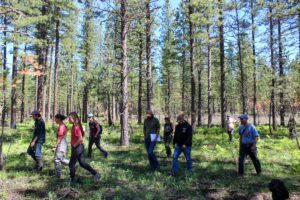East Cascades Oak Partnership Receives $7.1 Million OWEB Grant
Funding will advance conservation, stewardship, outreach, and monitoring on Oregon white oak landscapes in the East Cascades
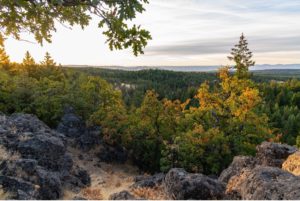
This property near Friend, OR will be permanently protected with grant funds. Photo by Brian Chambers.
The East Cascades Oak Partnership (ECOP) was awarded a $7.1 million grant from the Oregon Watershed Enhancement Board (OWEB) that will advance conservation, stewardship, outreach, and monitoring in the East Cascades through 2026.
ECOP works on the east slopes of the Cascades, where biodiversity and climate resilience are threatened by fire suppression, development, overgrazing, and passive management. Over 25 tribal, public, and private entities are partnering to implement ECOP’s Strategic Plan which aims to restore fire-adapted conditions, protect biodiversity, and maintain climate resilience.
ECOP was one of five new awardees, all working to support healthy watersheds across the state. The partnership recognizes the importance of Oregon white oak habitats that are vital to hundreds of species of plants and wildlife and to the region’s economy. The group brings together a wide range of partners to leverage resources, share knowledge, and implement conservation strategies that will protect vulnerable oak habitats and encourage more sustainable human interactions with these important resources.
“ECOP looks at conservation through the lens of human interaction,” said Partnership Manager Lindsay Cornelius. “It’s important to acknowledge that people have a variety of needs and interests across oak landscapes and that there are different ways of approaching conservation that can leverage positive outcomes for people and for nature. The work we will do can improve forage for livestock, reduce risk of catastrophic fire, and improve habitat for important foods and medicines, while improving ecological integrity.”
Climate modeling completed by The Nature Conservancy predicts portions of the East Cascades within the project area that have a high diversity of soil types, microclimates, and low levels of development, will have higher resilience to climate change. Protecting and restoring connected landscapes will help ensure plants and wildlife have the space and opportunity to adapt.
“In a time of changing climate, this Focused Investment Partnership initiative is well suited to support biodiversity in oak woodland and prairie habitats, and help protect vulnerable communities from catastrophic wildfire,” said OWEB Executive Director Lisa Charpilloz Hason. “The partnership will engage a broad diversity of people, and OWEB is excited to join them as a funding partner over the next six years. OWEB is committed to invest in conservation that helps communities mitigate and adapt to the impacts of climate change.”
With this infusion of OWEB funding, ECOP will protect 15,000 acres of habitat from conversion, reverse the effects of fire suppression on 17,000 acres, strategically deploy outreach to engage private landowners, lower barriers to the use of prescribed fire, expand access to native plant materials, and implement new monitoring and assessment tools.
“This funding announcement is a really important moment for ECOP”, said Cornelius. “We are overcoming misperceptions that oaks east of the Cascades are not important for conservation because they are smaller in stature and are locally abundant, when in fact they are critically important for migratory and resident birds, pollinators, and wildlife precisely because these oak habitats are still meaningfully connected from north to south, from high to low elevations, and from dry to wet climates, and this connectivity is an important element of resilience to climate change. This OWEB investment, along with an award to the Klamath Siskiyou Oak Network, signals an important shift that oak landscapes are finally getting conservation attention at the state level.”
Partners that will directly support project implementation include Oregon Department of Fish & Wildlife, Oregon State Parks, USFS – Mt. Hood National Forest and Columbia River Gorge National Scenic Area, Confederated Tribes of the Warm Springs, Columbia Land Trust, Oregon Department of Forestry, and the Natural Resource Conservation Service.
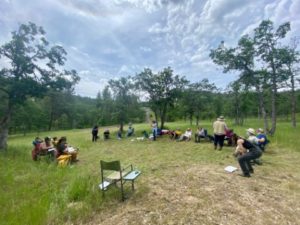
Learning is an important aspect of our partnership. Along with presentations, tours, and monitoring tools, ECOP also offers learning opportunities like this grass identification workshop for partners and the public.
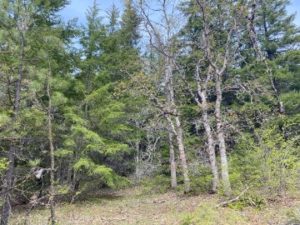
In the absence of periodic, low intensity fires, oaks can be overtopped and killed by Douglas-fir trees.
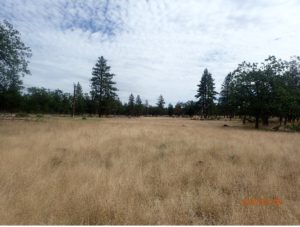
Invasive annual grasses like this ventenata grass growing on the Mt. Hood National Forest change fire dynamics and create dense monocultures that reduce biodiversity. ECOP’s work will explore and deploy control methods, evaluate impacts of thinning and fuel reduction on plant communities, and expand access to native seed sources.
The East Cascades Oak Partnership operates in both Oregon and Washington, and while this grant will directly support work in Oregon, the benefits will be felt across state lines.
